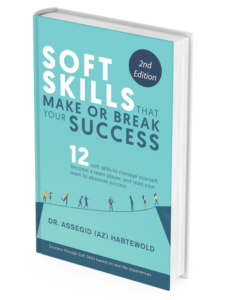22 Jul Why Should You Improve Your Soft Skills?
Why should you develop and improve your soft skills? Well, I have so many statistics and reasons that could convince you to give it a top priority arguing that it makes or breaks your success in any endeavor.
However, in this blog, let me just share with you why I wrote a book entitled “Soft Skills That Make or Break Your Success.” This short blog will show you how painful it is when you lack the necessary soft skills in your industry. Read it and let me know what you think…
Why I wrote the book
“I wrote this book because of the following four main reasons. I:
- Paid dire prices, and I don’t want others to pay the unnecessary consequences I experienced
- Witnessed colleagues in technical fields hurting their careers and relationships, and I hate to see other professionals have the same fate
- Watched teams, organizations, and communities suffer and vowed to play my small share to reduce the unwanted consequences of having members who lack people skills
- Realized that I cannot serve lots of individuals and organizations unless I write a book, which can go where I cannot
I. Paid dire prices
I failed to recognize the critical roles soft skills play in one’s success for many years. My obsession was improving my technical know-how and abilities to excel in what I was doing. I never intentionally invested in my people skills to stay relevant.
I feel embarrassed knowing that I didn’t have the necessary people skills as a professional, business owner, and leader. I wasn’t:
- Self-aware and full of blind spots,
- Managing my emotions and time poorly,
- Scanning and understanding my environment,
- Cognizant and attentive to the needs and feelings of others,
- Facing conflicts and addressing them on time,
- And so on.
As a result, I hurt my health. I struggled to connect, especially with people from different backgrounds and those with differing views, preferences, and styles. Yes, I was hard working and committed, but I wasn’t making progress and advancing as I wanted. I wrote this book because I don’t want anyone to pay these and many other unnecessary prices.
II. Witnessed colleagues hurting
I closely witnessed many of my colleagues in diverse industries, mainly in technical fields, undermining soft skills. I watched them give immense attention and invest in their technical skills, neglecting to work on their people skills. And as a result, they experience setback after setback in their personal life, career, and business. I was saddened to witness how they failed to:
- Discover their uniqueness, leverage their strengths, overcome their limitations, uncover their blind spots, and ultimately tap into their unlimited potential,
- Manage their emotions and scarce resources,
- Solve problems they’re facing quickly,
- Make the right and wise decisions on time,
- Get along with diverse stakeholders,
- Influence the people they lead, their peers, and their superiors.
Mind you. These are highly driven and technically savvy professionals. Unfortunately, they struggled to attract and keep relationships due to their lack of people skills. Though they were producing the most and shouldering the lion’s share, they weren’t the ones leading their team or department or program.
For instance, before I came to the US in 2005, I worked for an international research organization where I had a chance to work with many world-class scientists. Though they were the ones who came up with great research ideas, wrote white papers, and designed innovative research approaches to find answers to some of the most challenging research questions, they rarely led projects and managed project teams.
Back then, it didn’t occur to me. I thought these brilliant researchers didn’t like leading projects and managing people. However, retrospectively, I realized that it could be because they tried and failed. Or they were convinced that they couldn’t succeed without teaming up with colleagues who had people skills.
Where I was working and elsewhere it was common to see technically brilliant researchers without soft skills co-authoring with those who have people skills. They recruited the latter to help them communicate with donors and sponsors. They also wanted them to manage the people side of their projects. They also deferred presenting the papers, giving press releases, and appearing for media interviews for these colleagues who excelled in soft skills.
I wrote this book since I don’t want anyone technically savvy to struggle in representing, communicating, and leading their projects successfully. Of course, unless they wish to delegate these tasks to save time and energy to do other essential things that need their prime attention…” (Taken from p. 5, Soft Skills That Make or Break Your Success)
To learn more about the book, click here…
